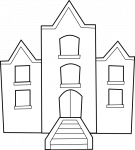This week students doing the Understanding Our World® program are exploring their environment and considering indigenous peoples. Younger students are learning about local history and planning a poster on a local issue. Older students are studying indigenous peoples around the world. All the students are working strongly on their main pieces of assessment for the term.
 Foundation/Prep/Kindy to Year 3
Foundation/Prep/Kindy to Year 3
Our youngest students, using the stand-along Foundation/Prep/Kindy unit (F.2) are exploring the sense of touch in their environment this week. Students consider a range of fabrics and textiles and choose which ones match their favourite place, for inclusion in their model or collage. Students in integrated classes of Foundation/Prep/Kindy and Year 1 (Unit F.6), Year 1 students (Unit 1.2), Year 2 students (Unit 2.2) and Year 3 (Unit 3.2) are starting to prepare a poster on an issue regarding their school, or local park/heritage place, while considering the local history. These investigations should be based on the excursion from last week. Students will have 2 weeks to prepare their posters, for display either at the school or a local venue, such as the library or community hall.
Years 3 to 6
 Students in Years 3 to 6 are continuing with their project on an explorer. Students in Year 3 (Unit 3.6) are examining Australian Aboriginal groups from extreme climate areas of Australia, such as the central deserts, or cold climate areas. Students then choose one of these groups to describe in their Student Workbook, and add to their presentation. Students in Year 4 (Unit 4.2) are studying indigenous peoples of Africa and South America. They will then select a group from the area visited by their explorer, to include in their presentation. Year 5 students (Unit 5.2) do the same with indigenous groups from North America; whilst year 6 students (Unit 6.2) have a wide range of resources on indigenous peoples from Asia to select for study and inclusion in their presentation. Resources are available on groups from across mainland Asia (such as the Mongols, Tatars, Rus, Han), as well as South-East Asia (such as Malay, Dyak, Dani etc.). This is the last section of work to be included in the presentation, and students will then finish their presentation and present it to the class.
Students in Years 3 to 6 are continuing with their project on an explorer. Students in Year 3 (Unit 3.6) are examining Australian Aboriginal groups from extreme climate areas of Australia, such as the central deserts, or cold climate areas. Students then choose one of these groups to describe in their Student Workbook, and add to their presentation. Students in Year 4 (Unit 4.2) are studying indigenous peoples of Africa and South America. They will then select a group from the area visited by their explorer, to include in their presentation. Year 5 students (Unit 5.2) do the same with indigenous groups from North America; whilst year 6 students (Unit 6.2) have a wide range of resources on indigenous peoples from Asia to select for study and inclusion in their presentation. Resources are available on groups from across mainland Asia (such as the Mongols, Tatars, Rus, Han), as well as South-East Asia (such as Malay, Dyak, Dani etc.). This is the last section of work to be included in the presentation, and students will then finish their presentation and present it to the class.

 Foundation/Prep/Kindy to Year 3
Foundation/Prep/Kindy to Year 3
Since implementing this program I've really noticed how the students are improving.
Trent Perry, Teacher